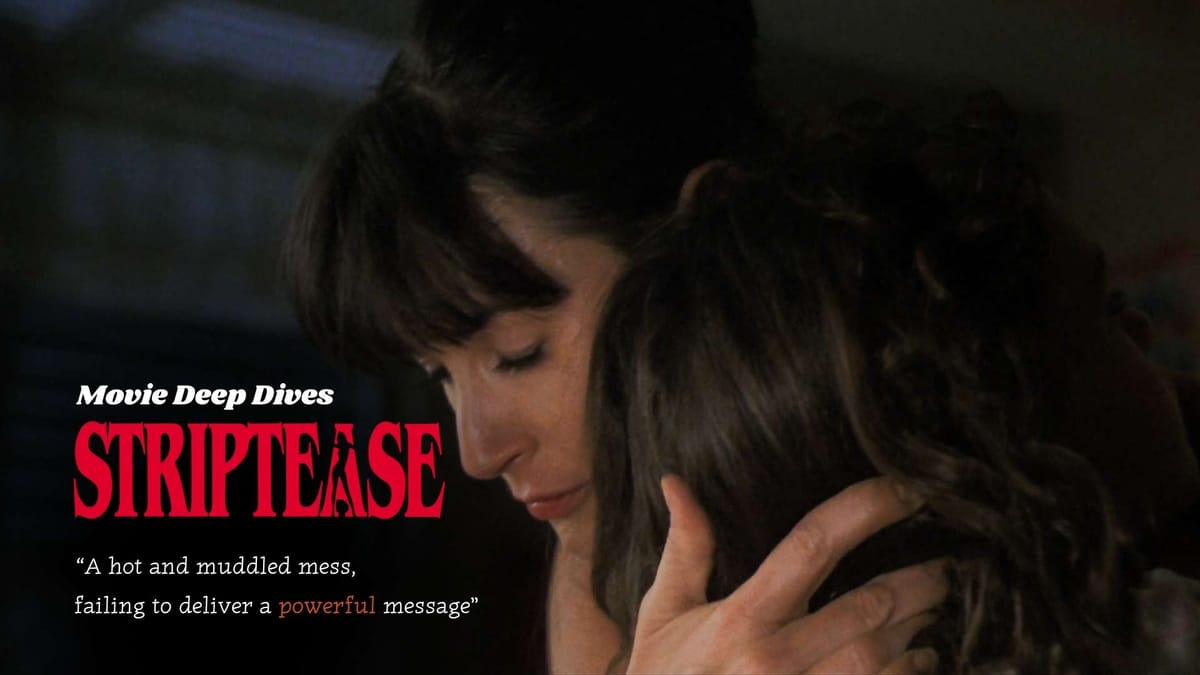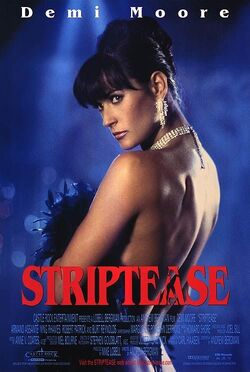Movies Uncovered - Striptease (1996): Failing to deliver powerful messages
While Striptease aimed for satire, it stumbled into controversy. Our analysis reveals a film grappling with complex themes, yet marred by problematic execution. Join us as we dive down deep!

Here at Rewind Zone, we believe that every film is a tapestry of meanings, intentions, and cultural reflections. Our mission is to peel back these layers, offering insights and explanations that may not be immediately apparent to the viewer. We dive deep into the heart of cinema, exploring the nuances that make each film a unique piece of art and social commentary.
Today, we turn our analytical lens to the 1996 film Striptease, starring Demi Moore and directed by Andrew Bergman. This movie, often dismissed by critics, raises several questions: Was its meaning lost amidst the controversy? Did it offer more substance than its detractors claimed? Was there a deeper social commentary hidden beneath its provocative surface?
Join us as we examine Striptease in detail, exploring its themes, production context, and reception. From its place in Demi Moore's career trajectory to its reflection of socio-political issues of the time, we'll investigate whether this film deserves a reassessment.
Trailer
What is the point of Striptease?
Striptease is a satirical comedy-drama that aims to:
- Critique corruption in politics and law enforcement
- Explore the lengths a mother will go to for her child
- Examine societal attitudes towards sex work and female empowerment
- Blend comedy with social commentary on class and power dynamics
Directed by Andrew Bergman and released in 1996, the story revolves around Erin Grant (Demi Moore), a former FBI secretary who turns to stripping (dancing—sorry, Shad!) to earn money for a custody battle for her daughter. The film uses humour and exaggeration to highlight issues of political corruption, economic desperation, and the objectification of women.
Cast
- Demi Moore as Erin Grant
- Burt Reynolds as Congressman David Dilbeck
- Ving Rhames as Shad
- Armand Assante as Lt. Al Garcia
- Robert Patrick as Darrell Grant
Director Andrew Bergman on casting Demi Moore: "Demi brought an intensity and vulnerability to Erin that really elevated the character beyond just a sexy lead."
Timeline Slideshow
Themes and Meaning of Striptease
Motherhood and Sacrifice
The central theme of the movie is how far a mother will go to protect and provide for her child. Erin's journey highlights:
- The moral compromises parents might make for their children
- The societal judgement faced by mothers in unconventional professions
- The strength and determination of single mothers
Political Corruption
The film offers a scathing critique of political systems:
- Congressman Dilbeck embodies the hypocrisy in politics
- The plot exposes the interconnectedness of crime, law enforcement, and government
- It satirises the public's often complacent attitude towards political misconduct
Female Empowerment vs. Objectification
Striptease navigates complex themes of feminism and sexuality:
- It presents stripping as both empowering and potentially exploitative
- The film challenges viewers to confront their own biases about sex work
- Erin's character arc explores the notion of reclaiming one's sexuality as a form of power
Class and Economic Struggle
The movie sheds light on economic disparities:
- Erin's financial situation drives her to strip, highlighting limited options for those in lower socioeconomic classes
- The contrast between the wealthy politicians and the working-class characters underscores societal inequalities
- The strip club becomes a microcosm of larger economic power dynamics
The Role of Humour
Unlike more serious dramas, Striptease employs comedy and satire to address its themes:
- Exaggerated characters and situations provide social commentary through humour
- The film's comedic elements make its critical messages more palatable to a wider audience
- However, the use of humour risks undermining the gravity of some of its themes
Cinematography and Setting
- The vibrant Miami setting provides a colourful backdrop that contrasts with the often dark subject matter
- Strip club scenes are choreographed to emphasise both the performance aspect and the voyeuristic nature of the profession
- The film's visual style blends neo-noir elements with bright, almost garish colours, reflecting its mix of dark themes and comedy
Critical Reception and Counterpoints
While our analysis has explored various aspects of Striptease, it's crucial to acknowledge the film's significant shortcomings and the problematic aspects of its production and reception. Some critics and viewers argue that the film represents a low point in 1990s Hollywood, exemplifying troubling industry practices and societal attitudes:
- Exploitation Disguised as Empowerment: The film's production, centred around Demi Moore's record-breaking $12.5 million salary, raises questions about the true motivations behind the project. Critics argue that the studio was essentially paying for a major star to disrobe, rather than for acting talent or a compelling story.
- Shallow Character Development: Many critics point out that the film fails to develop meaningful characters, particularly in its portrayal of supporting female characters. The strippers, who aren't Moore's character, are often depicted as unintelligent, reinforcing harmful stereotypes.
- Misguided Attempts at Progressiveness: While the film may have aimed to present a non-judgmental view of stripping, some argue that it ultimately objectifies women under the guise of empowerment. The special treatment of Moore's character (as a mother and former professional) compared to other strippers is seen as particularly problematic.
- Illogical Plot and Poor Execution: Critics note that the film's plot is riddled with absurdities and poorly executed scenes, suggesting that little thought was put into the story beyond the central conceit of Moore's nudity.
- Reflection of Industry Problems: The film's production and marketing are seen by some as emblematic of broader issues in 1990s Hollywood, including the objectification of women and the prioritization of sensationalism over substance.
- Missed Opportunities: Critics argue that the film squandered the chance to explore meaningful themes about sex work, desire, and the adoption of sexual personas, instead opting for shallow titillation.
These criticisms suggest that Striptease, rather than being a clever satire or empowering narrative, may be more accurately viewed as a product of its time - one that reflects problematic attitudes and practices in the film industry and society at large.
Striptease received mixed reviews upon its release:
- Some critics praised its satirical elements and Moore's committed performance
- Others felt it failed to effectively balance its tones and messages
- The film was a moderate box office success but fell short of expectations given its high-profile cast
Roger Ebert: "Striptease is not, in short, quite what I expected. It's serious about its plot and characters, and not just a romp about sex and corruption."
Interesting Facts
- Demi Moore was paid a then-record $12.5 million for her role, making her briefly the highest-paid actress in Hollywood.
- Moore spent months training with real strippers to prepare for her role.
- The film is based on the novel of the same name by Carl Hiaasen.
- Burt Reynolds won a Razzie Award for Worst Supporting Actor for his role as Congressman Dilbeck.
- Despite its mixed reception, the film has gained a cult following over the years.
Misunderstandings of the Film
- Just a Vehicle for Nudity: While the film does contain nudity, reducing it to mere titillation misses its satirical intent and social commentary.
- Anti-Feminist: Some viewed the film as exploitative, but it attempts to explore female empowerment in complex ways.
- Purely Comedic: While marketed as a comedy, the film deals with serious themes that some viewers overlooked.
- Biographical: Some mistakenly believed the film was based on a true story due to its political corruption plotline.
Memorable Quotes
- Erin Grant: "I'm just a mother trying to make a living."
- Congressman Dilbeck: "I am above the law!"
- Shad: "Everybody's a visionary; they just don't have any vision."
- Erin Grant: "No matter how bad things get, you can always see a little light."
- Lt. Al Garcia: "In politics, you've got to have a fallback position."
Casting Demi Moore: A Controversial Choice
Moore's Career Leading Up to Striptease
Prior to Striptease, Demi Moore had established herself as one of Hollywood's most bankable stars. Her notable roles included:
- Ghost (1990): A romantic fantasy that showcased her dramatic range
- A Few Good Men (1992): A high-profile legal drama where she held her own against Tom Cruise and Jack Nicholson
- Indecent Proposal (1993): A controversial drama that dealt with themes of morality and sexuality
- Disclosure (1994): A thriller that touched on sexual harassment and power dynamics in the workplace
These roles demonstrated Moore's ability to tackle complex, often controversial subjects, making her an intriguing choice for Striptease.
Do I think Moore would have accepted the role if she knew the final product? No.
Was it Miscasting?
The casting of Moore was met with mixed reactions:
- Pro: Her star power brought attention to a film with challenging themes
- Con: Some critics felt her polished Hollywood image didn't fit the gritty reality of a struggling single mother
Film critic Janet Maslin: "Demi Moore's role in Striptease is not the sort of gutsy departure from type that reveals an unexpected side of the actress."
Moore's Career Trajectory
Striptease (1996) and G.I. Jane (1997) marked a shift in Moore's career:
- Both roles required intense physical preparation
- They challenged traditional notions of femininity and female roles in film
- These choices suggested Moore was actively seeking roles that pushed boundaries and sparked discussions about women's empowerment
Moore's Career Impact
- Moore was the first actress to receive a $12.5 million salary (for Striptease)
- Her preparation for both Striptease and G.I. Jane became part of the films' marketing narratives
- These roles cemented her status as an actress willing to take on physically demanding and controversial parts
Director Andrew Bergman's Background
Andrew Bergman came to Striptease with a strong background in comedy:
- He co-wrote Blazing Saddles (1974) with Mel Brooks
- Directed The Freshman (1990) and a film of the same year, which I enjoyed, It Could Happen to You (1996)
- Known for his satirical take on American culture and institutions
Bergman's comedic background influenced Striptease, infusing serious themes with humour and satire.
Comparative Context: Mid-90s Cinema
Striptease can be viewed alongside other films of the mid-90s that blended comedy with social commentary:
- The People vs. Larry Flynt (1996)
- Also dealt with themes of sexuality, free speech, and political hypocrisy
- Took a more dramatic approach to similar subject matter
- Showgirls (1995)
- Another film centred around stripping but with a much more exploitative approach
- Critically panned but gained a cult following
- To Die For (1995)
- A dark comedy that satirised media obsession and ambition
- Featured Nicole Kidman in a career-defining role, similar to Moore's attempt with Striptease
- Boogie Nights (1997)
- Explored the adult entertainment industry with a mix of drama and dark humour
- Received more critical acclaim for its treatment of similar themes
- Mighty Aphrodite (1995)
- Woody Allen's comedy that touched on sex work with a lighter, more whimsical tone
These comparisons highlight how Striptease was part of a broader trend in 90s cinema that explored sexuality, media, and social issues through various generic lenses.
Final Thoughts
As we reflect on Striptease, it's clear that the film's legacy is complex and largely problematic. Was Striptease a good film? In short, no. The primary issues with the film lie squarely with the director, Andrew Bergman, and the marketing team behind it.
The very title "Striptease" set the wrong tone from the start. If the filmmakers truly wanted to be taken seriously about highlighting social injustice, they made several critical missteps:
- They relied heavily on Moore's nudity to market the film, undermining any serious message.
- They portrayed the supporting cast of strippers as simple-minded, reinforcing harmful stereotypes.
- They failed to address the disgusting behaviour of the male characters with the gravity it deserved.
The decision to approach such sensitive subject matter through satire could have been innovative, but it required a delicate touch that Bergman ultimately lacked. The film's failure to coherently convey its message—if there truly was one beyond titillation - falls squarely on the director's shoulders, not the actors, especially not Demi Moore.
It's worth questioning whether Bergman was genuinely trying to highlight injustice with this movie. The evidence suggests not. The "message" feels so afterthought that it might as well have never existed in the first place.
Moore, however, was unfairly criticised for her role. Her response to this criticism was telling: she teamed up with Ridley Scott for G.I. Jane, delivering a powerful performance. Yet, frustratingly, she faced criticism for that role, highlighting the no-win situation many actresses encountered during this era. (Thankfully, the film has recently been taken more seriously by viewers and is finding its audience!)
Striptease represents a comedy of mismanagement, a case study of how not to handle sensitive topics in cinema. As one critic astutely noted, "This should have been Moore's Road House", a statement that underscores the missed opportunity for Striptease to make headlines for the right reasons.
In the end, Striptease serves as a cautionary tale about the importance of clear vision in filmmaking, especially when dealing with complex social issues. It reminds us of the power of cinema to either challenge or reinforce societal norms, and the responsibility that comes with that power. While the film failed in many respects, it has inadvertently contributed to important discussions about gender representation, the treatment of sex workers in media, and the often problematic nature of Hollywood's approach to "controversial" topics.
Our Verdict

Rewind Zone Final Score
For More Deep Dives visit: Deep Dives
Interesting Videos:




Comments ()